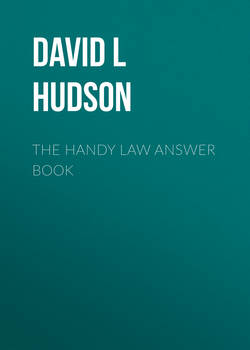Читать книгу The Handy Law Answer Book - David L Hudson - Страница 125
На сайте Литреса книга снята с продажи.
FIFTH AMENDMENT What freedoms does the Fifth Amendment protect?
ОглавлениеThe Fifth Amendment provides: “No person shall be held to answer for a capital, or otherwise infamous crime, unless on a presentment or indictment of a Grand Jury, except in cases arising in the land or naval forces, or in the Militia, when in actual service in time of War or public danger; nor shall any person be subject for the same offense to be twice put in jeopardy of life or limb; nor shall be compelled in any criminal case to be a witness against himself, nor be deprived of life, liberty, or property without due process of law; nor shall private property be taken for public use without just compensation.”
The Fifth Amendment—the longest in the Bill of Rights—provides the following protections:
1 Right to a grand jury
2 Protection against double jeopardy
3 Protection against self-incriminationLegalSpeak: Mapp v. Ohio (1961)Justice Tom C. Clark: (majority): “The criminal goes free, if he must, but it is the law that sets him free. Nothing can destroy a government more quickly than its failure to observe its own laws, or worse, its disregard of the charter of its own existence…. [T]he ignoble shortcut to conviction left open to the State tends to destroy the entire system of constitutional restraints on which the liberties of the people rest. Having once recognized that the right to privacy embodied in the Fourth Amendment is enforceable against the States, and that the right to be secure against rude invasions of privacy by state officers is, therefore, constitutional in origin, we can no longer permit that right to remain an empty vessel.”
4 Due process
5 Just compensation
